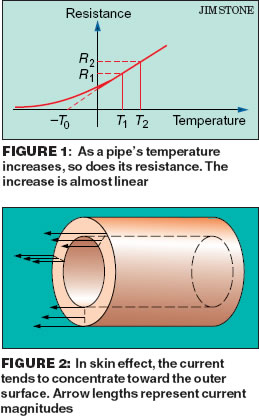Impedance Heating
 For decades, plumbers have thawed frozen water pipes by connecting portable welder electrodes to both ends of the frozen section and running a low-voltage current through the pipe. Effectively, the pipe becomes a heating element, melting the ice inside. That, in its simplest form, is impedance heating.
For decades, plumbers have thawed frozen water pipes by connecting portable welder electrodes to both ends of the frozen section and running a low-voltage current through the pipe. Effectively, the pipe becomes a heating element, melting the ice inside. That, in its simplest form, is impedance heating.
In industrial applications, a multitap a.c. transformer supplies low-voltage current to a pipe transporting a gas or liquid. Connecting cables, a control panel and electrical isolation of the heated pipe complete the package. Typical applications are shown in Table 1.
Impedance heating is used because it is simple to apply, eliminates the risk of heater burnout, requires little maintenance, and provides uniform heating along the length of the pipe – a critical factor when dealing with fluids sensitive to spot overheating. But despite its long history, impedance heating and its electrical effects are little understood.
Impedance, which determines the heating rate of a pipe and its contents, is influenced by three key factors:
- Electrical resistivity (and its variation with temperature) is always significant, since it is the basis for the d.c. resistance of any conductor
- Magnetic permeability is a function of the metallurgy of the pipe material and its environment (temperature, magnetic field, and so forth). For magnetic steels, such as plain carbon steel, permeability contributes to both skin effect and proximity effect, as described in the following pages
- Current density is the distribution of current throughout the cross-sectional area of a conductor. A high current density occurs when a large current flows through a small area
To gain a thorough understanding of how these phenomena interact to produce impedance heating in a pipe, Industrial Engineering and Equipment Co. (Heatrex; St. Louis, Mo.), commissioned a three-year study by the Electrical Engineering Dept. at the University of Missouri at Rolla. This article is based on the findings of that study.
Read more here!